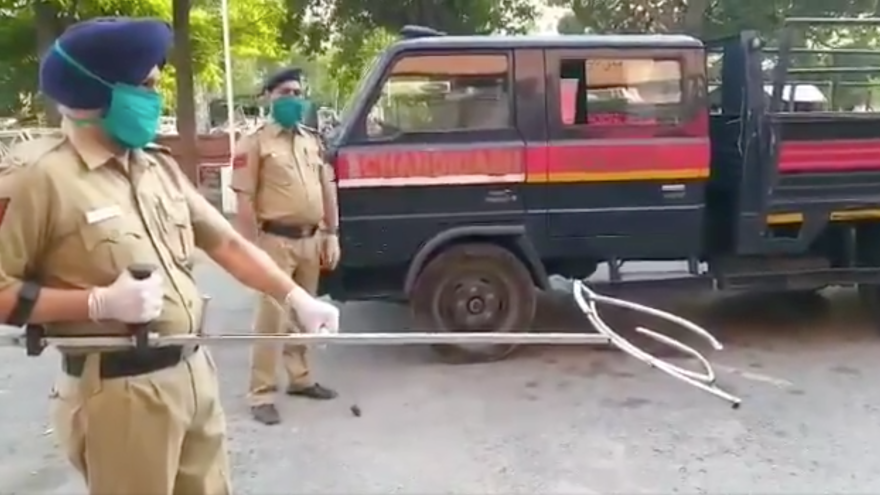For police, the new coronavirus poses a dilemma: How do you apprehend a suspect in the era of social distancing?
In India, they've come up with a way to lengthen the long arms of the law: giant tongs.
In what looks more like a scene from a cops-and-robbers cartoon, this week police in the northern city of Chandigarh tweeted a video of an officer demonstrating how to use a 6-foot pole with a two-pronged claw at the end to detain a suspect. The officer, wearing a surgical mask, clamps the device around a man's waist and forces him into a pickup truck.
Really???
— Wasiq (@WasiqAbass) April 26, 2020
It is appalling, to say the least.
Ever heard of something called 'human dignity'?
"We call it a 'social distancing clamp' or a 'lockdown-breaker catcher,' " head constable Gurdeep Singh told NPR by phone from Chandigarh Police headquarters. "This is especially used in instances where we suspect that someone has the coronavirus and they are not cooperating with us."
Chandigarh, the joint capital of the Indian states of Haryana and Punjab, has been declared a containment zone, with a high concentration of COVID-19 cases. Nationwide, India has more than 24,000 active cases and has counted about 1,100 deaths — though testing has not been widespread.
Officers in Chandigarh are still practicing with a prototype of the claw contraption and haven't yet put it into use against criminals, Singh says.
"Great equipment, great drill !!!" their director-general, Sanjay Baniwal, tweeted with the video.
Not everyone agrees. On Twitter, some people called the device "appalling" and a violation of "human dignity." Others applauded the police for their creativity to "control stupid people."
This is only the latest unconventional innovation by Indian police during the coronavirus crisis. In the central Indian city of Nagpur, officers were filmed in March forcing lockdown violators to do exercise squats in the street. And near the popular tourist resort of Rishikesh, in the north, when foreign backpackers strayed from their hostels, police made them write "I did not follow the rules of lockdown. I am very sorry" 500 times.
As for the giant tongs, Chandigarh policeman Singh says he got the idea from police in Nepal, where officers have reportedly detained over 1,400 suspects using a similar "multifunctional arrest device."
But he says the one designed in India has additional features.
"We can expand the size depending on the person's waistline," Singh explains.
Copyright 2021 NPR. To see more, visit https://www.npr.org.




